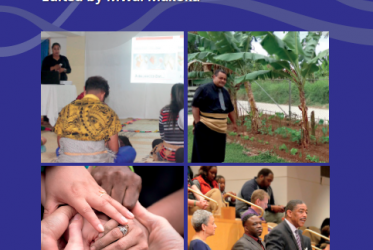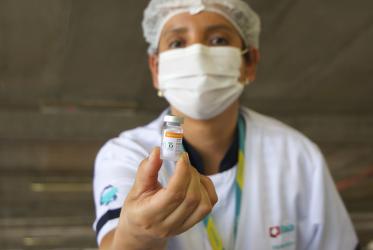In a pastoral letter marking the 50th anniversary of Earth Day, Rev. James Bhagwan, general secretary of the Pacific Conference of Churches (PCC), reflected on what a “renewal” of our normal might offer Pacific churches and communities.
“The brief respite that the land, oceans, rivers and even air have received as a result of COVID-19-induced lockdowns, has shown what is possible if humankind allows the earth to experience a sabbath, a jubilee,” writes Bhagwan. “New ways of working, connecting and interacting are being used.”
We have begun to realise what we can do without, and what is important to us, he reflects. “Individualism and materialism are waning as relationality and positive traditional values and spirituality are increasing,” he writes. "Yet, I would like to suggest that this is not a new normal. It is a return to the original normal."
The current normal that we have acquiesced to is a predatory system of economic extraction that contradicts the purpose of God, he continues. “This extractive totalism of the current normal is contradictory to our Pacific spirituality and indigenous wisdom,” he writes. "Celebrating Easter in the context of COVID-19 offers us to look at the resurrection as an alternative to the current normal, a normal of exploitation of creation and of death.”
The Pacific Conference of Churches is setting up a Pacific Foodbank. “For many Pacific communities, the earth (ground) is their refrigerator, stock exchange, supermarket or ATM machine,” writes Bhagwan. “We have half an acre of prime property lying unused just outside the Central Business District of Fiji’s capital, Suva.”
On 23 April, the land will be tilled to make way for quick-growing crops – beans, cabbages, cauliflower, tomatoes, cucumber and capsicum. “Anyone is free to come and take food as they need – some tapioca, cabbages and bananas for the family meal,” Bhagwan writes. “There will be no charge.”
The gardens will be organic. "It is our hope that this will be a step towards encouraging people to plant their own food, harvest responsibly and share from their abundance," writes Bhagwan. “Some of the food will be distributed to the destitute in informal settlements, housing projects for the destitute and aged care facilities.”
Coping with the Coronavirus - WCC landing page





